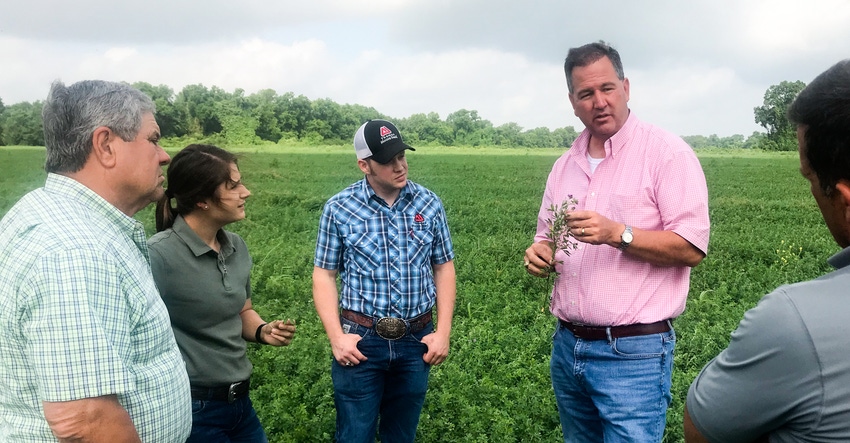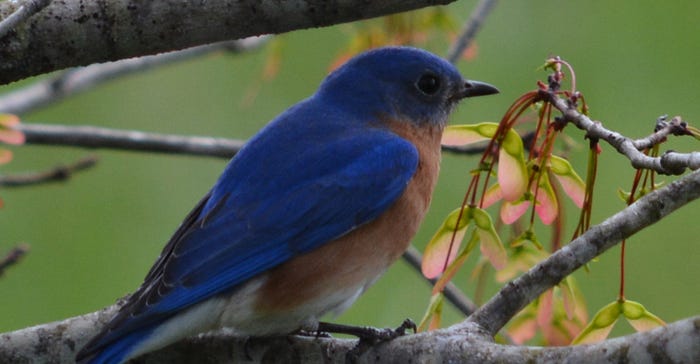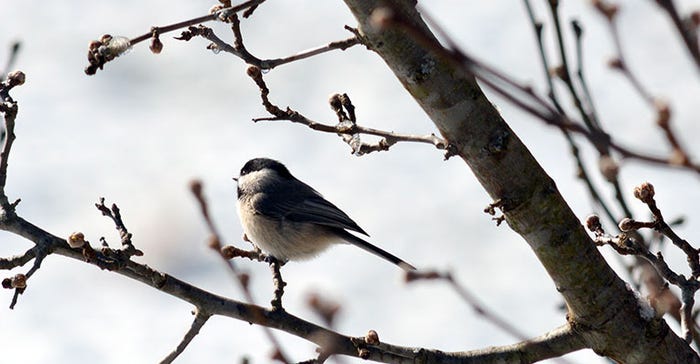
While the COVID-19 quarantine has silenced school hallways, emptied local businesses, and quieted church sanctuaries, it hasn't silenced the spring calls of the barred warbler or dulled the beauty of a blue jay, sights and sounds homebound Americans seem drawn to in these troubled times.
"All of our business was up -- birdseed, horse, cattle, and chicken feed -- for the first couple of weeks after COVID restrictions started," says Matt Moore, a fifth-generation row-crop farmer and owner of Thomas Moore Feed in Millican, Texas.
"Americans were purchasing animal feed like they're purchasing human food, thinking it wasn't going to be there. And people are hanging around the house more, so they're feeding birds. But sales are beginning to normalize."
Each year, Texans spend about $1 billion on birdseed, says Moore.

Thomas Moore Feed creates birdseed blends for domestic and wild birds, which contain variations of corn chips, millet, milo, safflower, and black oil sunflower seeds. Along with growing sunflowers himself, Moore also contracts with local growers.
"We use a lot of sunflowers. We've been getting them from Waco and importing from the Dakotas and Colorado. So, I'm trying to contract more here and will grow quite a few myself," he says.
Moore and his local growers will produce about 3,000 acres of sunflower. "That should yield about 2,000 pounds per acre, which meets about 50% of our demand."
One benefit of contracting locally is less money spent on freight. For example, freight from a Lubbock farm, about 1,000 miles roundtrip, to Millican costs about $1,500. Whereas, freight from Snook, 20 miles east of Millican, where Jay Wilder is growing sunflowers for the first time, is about $250. "That's a game-changer," says Moore.
Double-Cropping
Wilder, who also grows cotton and grain sorghum and runs cattle, will store sunflower seeds for Moore on his farm. Wilder and Moore plan to double-crop a portion of their sunflower acres.
"The irrigated acres are under center pivot," Wilder says. "These seed are supposed to take about 85 days, so in early June, we'll harvest those and plant a second sunflower crop into that same field. We have the heat units to get it done, but it can get iffy on the back end because it's about the same time we'll be harvesting cotton and it's hurricane season."
Moore says he's a bit skeptical but will give it a try.
"I've done some double-cropping with other crops but not with sunflowers," Moore says. "If it works, black oils will be the best crop I've grown.
"On paper, it looks phenomenal," he says with a laugh.
On his dryland acres, Moore planted a new variety of black oils called Falcon and variety 521 on his irrigated acres.
"I grew black oils four years ago, and then the price depressed, so I quit growing them. Now, I'm back growing them again."
Cotton First
Moore has deep roots in production agriculture. His family has been producing cotton since 1836. "Really before 1836. My great-granddad fought in the Battle of San Jacinto and was already in Texas, so we've been farming cotton ever since."
Everything Moore grows is in rotation to benefit cotton, he says. "We do a 50-50 rotation. We grow grain one year and cotton the next. This year, I'm planting black oils instead of milo."

Moore also runs cattle and produces corn, the commodities which instigated his feed business. "I first started bagging corn. We grew corn and had an elevator, so we put in a cheap cleaner and started making cattle feed," he says.
His feed business has expanded to include horse, barnyard, wildlife, poultry, gamebird and small animal feed. "We made about 85,000 tons of feed last year."
H-E-B Invitation
Six years ago, Moore's feed caught the attention of H-E-B, a Texas-based supermarket chain. "They came to me and said, 'You do what we do (make feed). We're hauling birdseed from Colorado. Would you consider making it?'
"I didn't know a thing about it. They also asked if I had an ornithologist (a person who studies birds) on staff. I said, 'I'd have to know what one is first.'"
Since that initial conversation, Moore says he's learned a lot. "We hooked up with the Texas Ornithological Society and the Warbler Woods Bird Sanctuary and put together eight to 10 blends and tested them at the sanctuary for about six months to see what birds eat. The H-E-B team taught us about quality control (QC). We thought we knew QC, but when H-E-B comes to town, it's a whole different set of standards."

Today, Thomas Moore Feed bags 75 domestic bird seed blends and 15 wild bird blends and has added a Ph.D. nutritionist to the staff. More than 1,000 Texas grocery stores sell Thomas Moore Feed birdseed.
"We're blessed. Our birdseed business has been successful, not mainly because of what we do but because of our location. We're in the middle of Houston, Dallas, and San Antonio, so there's lots of birdseed sold right here. And if we can keep our grain supply close to home, it gives us a competitive advantage."
COVID-19
Thomas Moore Feed has not gone untouched by the current pandemic. Typically, H-E-B sends a truck to pick up birdseed at Moore's plant. "They called and said, 'We can't pick up our seed anymore. You're going to have to bring it. We need every truck we have to haul food to keep food on the shelves.' So, we're delivering.
"It's been a learning curve and interesting to watch H-E-B try to keep people fed."
Practicing social distancing at his plant, Moore says he's weathering the pandemic first through his faith in Jesus Christ but also reminding his employees about the power of kindness. "I've told my employees all we want to do is be kind. Everybody is stressed, everybody is uptight, so just be kind and do what we can do to make a difference in people's everyday lives."
For more information about birding, birdseed, and feeders, go to http://www.thomasmoorefeed.com.
About the Author(s)
You May Also Like






